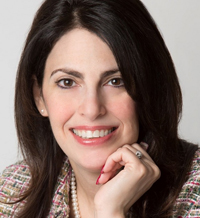
Danielle Lindner was a full-time working mom with two children who needed care during the day. She had little trouble finding safe, nurturing places, but she wasn’t finding programs that shared her educational priorities for her children.

Danielle Lindner, founder of London Day School.
Teaching at the elementary level proved that “you couldn’t bring in someone to teach Italian or Mandarin even if it was free, because everything had to be approved by 500 different people and there is so much red tape,” she said. “I thought if I opened my own preschool, I could design it how I see it best fit these children.”
Lindner did just that in 2010, opening London Day School in Florham Park, New Jersey, in hopes of helping other moms and dads who felt like she did. “If they are going to be in school all day or half-day, it should be meaningful to them. It shouldn’t be babysitting,” she said. Now she’s expanding the concept with London Day School franchises that allow preK entrepreneurs to implement her philosophy in communities across the United States.
Nurturing skills for elementary success
The London Day School philosophy is that even if kids come into the program shy, reluctant to share or uncomfortable about being away from Mom, by the time they arrive in elementary school, they’ll be far ahead of their peers.
“We have a public-speaking program called Star Student, so every year they have to get in front of their class and talk about themselves — only getting positive feedback. So for four or five years, they’re getting the positive feedback, and when they’re going into elementary school, public speaking is not a big deal for them. We’re nurturing their sense of self and self-esteem,” said Lindner.
Lindner said she wishes schools would talk about learning abilities rather than disabilities. “Many of these children are extremely smart. They may have ADD, ADHD and Asperger’s. However, they can learn, but they learn in a different way,” she said. “Instead of looking at it as we have children who have learning disabilities, we need to change the system so we find what works best for our kids and we adjust the classroom.”
Starting young, getting creative
London Day School goes for a holistic, creative approach to learning. “We give kids a lot of respect,” Lindner said. “Just because a child is 2 or 3, we talk to them as if they are smart, intelligent beings. When we do STEM, we use the words chemistry or biology,” said Lindner. “It might just be mixing colors, but the fact we’re using the word chemistry and kids are having a positive experience with that, once they get into elementary school they are not afraid of it.”
The school moves students through a series of centers focusing on specific learning areas. “Instead of making it a choice, we say we want you to try everything. With a lot of kids, if there’s something that’s difficult, they won’t do it. We’re big on adjusting, and we give our teachers leeway to let their children be a guide in some respect,” said Lindner. “The primary goal in our school is to be engaged learners. Every circle time, we do an activity with divergent thinking.”
Franchising an approach to learning
Lindner started franchising her school model in February. Her company is interviewing people who want to bring this program to their communities.
“There are many franchise opportunities out there, but I feel like they’re all the same,” she said. “This is a different, creative approach to learning. We want people who are primarily excited about early childhood education and not (looking for) a real estate investment.”
They seek people who are passionate about making a change in their lives, maybe leaving corporate America and doing something that is more fulfilling, getting more of a work-life balance and making a difference in children’s lives in their community.
Lindner’s tips for elementary teachers
Lindner offered these tips for effectively addressing the growing social and emotional issues affecting young children, and focusing on building emotional and social IQ:
- Stress character education. In the morning, do a quick activity with your kids that builds character.
- Institute a buddy program. “One of the things we see is kids sitting alone at lunch,” she said. “It’s important for schools to take a proactive approach to make sure kids aren’t sitting by themselves.”
- Offer expert guidance. Have guidance counselors talk to the kids about different issues.
- Reward good behavior. If the teacher sees someone sharing, they should stop and talk about it. The more kids are caught doing something good and recognized for it, the more they will innately do it.
- Refocus away from disability. If a strategy isn’t working for one child, get together with other teachers in the grade and talk about alternative strategies.
Establish a school-home connection
Lindner stressed there should be a parent-school connection. “Elementary school is busy. There are a lot of demands on teachers. Parents have to reach out to teachers and build that school-home connection,” she said. “Something as simple as the child not getting enough sleep can interrupt their day in school. The teacher may think there is a behavior issue when in reality there is something bothering them at home.”
Perhaps they’re not getting enough sleep, or the parent doesn’t know they should get them to bed earlier, or Dad is on a long business trip so the child is acting out. “The more information you can share across school and home,” Lindner said, “the more success they will have.”
Erin Flynn Jay is a writer, editor and publicist, working mainly with authors and small businesses since 2001. Erin’s interests also reach into the educational space, where her affinity for innovation spurs articles about early childhood education and learning strategies. She is based in Philadelphia.
Categorized as: Teacher Recognition
Tagged as: Early Childhood and Elementary (Grades: PreK-5), New Teacher, Professional Development